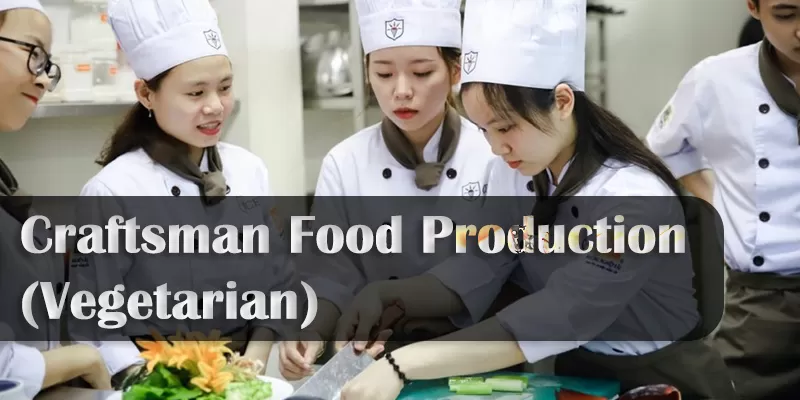
Directorate General of Training (DGT)
Under the Ministry of Skill Development & Entrepreneurship, the Directorate General of Training (DGT) offers a wide range of vocational training programs to meet the demands of various sectors of the economy and labor market. These programs are delivered under the aegis of the National Council of Vocational Training (NCVT).
The Craftsman Training Scheme (CTS) and Apprenticeship Training Scheme (ATS) are two pioneering initiatives of the NCVT designed to promote vocational training across the country.
Broad Competencies Expected from Candidates
After completing the vocational training program, candidates should be able to:
- Read and interpret technical documents, plan and organize work processes, and identify necessary materials and kitchen tools.
- Perform tasks with due consideration to safety rules, accident prevention regulations, and environmental protection guidelines.
- Apply professional knowledge, core skills, and employability skills while performing tasks and solving problems during execution.
- Identify and select raw materials, pre-process them, and choose appropriate cooking methods.
- Prepare products adhering to food safety standards.
- Document technical parameters related to their tasks.
Trade Summary: Food Production (Vegetarian)
Job Roles After Completion of Apprenticeship Training:
- Identifying & Selecting Raw Material
Understand quality and selection standards for ingredients. - Usage of Kitchen Equipment
Operate and maintain tools and machines effectively and safely. - Food Handling
Ensure minimal damage or loss while processing food. - Pre-Processing for Cooking
Carry out tasks like cleaning, chopping, marinating, etc. - Skilled in Cooking Methods
Execute various cooking techniques as per recipes and requirements. - Food Presentation & Serving
Present and serve food at appropriate temperatures. - Nutrition & Food Allergies Knowledge
Understand nutritional values and be aware of common food allergens. - Basic Computer Usage
Operate computers or tablets for recipe management, inventory, etc. - Resource Planning & Utilization
Plan and manage raw material, time, and manpower. - Knowledge of HACCP / ISO Standards
Understand and apply food safety standards.
Employability & Personality Skills
- Maintain personal hygiene and grooming.
- Punctuality and respect for time.
- Demonstrate good interpersonal skills and respect towards colleagues.
- Practice good housekeeping in the work area.
- Follow safety protocols while handling tools and machinery.
- Communicate effectively (basic verbal & written skills).
- Apply basic arithmetic and commercial math skills.
- Practice reuse, recycling, and safe disposal of waste.
- Optimize the use of natural resources (water, heat, electricity, fuel).
- Demonstrate knowledge of basic first aid and fire safety (e.g., use of extinguishers).
Learning Outcomes
Common Occupational Skills (Block I & II)
- Recognize and follow safe working practices, environmental regulations, and good housekeeping.
- Understand basic mathematical and scientific principles, including work, power, energy, algebra, percentages, units, mass, weight, and density.
- Apply concepts of productivity, quality tools, and labor welfare legislation to improve work efficiency.
- Contribute to energy conservation, reducing global warming, and preventing pollution through resource optimization.
- Understand personal finance, entrepreneurship, and manage tasks for personal and societal development.
- Plan and organize work effectively.
Specific Learning Outcomes
Block I (First Year)
- Understand the use of utensils, equipment, and sanitizing agents for kitchen tools.
- Identify and use spices and herbs appropriately.
- Perform various cooking methods and explain the effects of heat on different foods.
- Prepare chutneys and dips using appropriate tools and machines.
- Prepare Indian breads and tandoori dishes.
- Make basic Indian gravies (Tomato, Onion, Cashew, Yoghurt-based).
- Cook dishes using vegetable gravies.
- Prepare rice dishes, pulaos, veg biryanis, and dals.
- Create traditional Indian sweets (Burfee, Balushahi, Halwas, Gulab Jamun, Jalebi, Gujia, Phirni, Rasgulla).
- Explore and prepare different regional foods.
Block II (Second Year)
- Prepare and explain stocks, soups, and sauces.
- Make hors d’oeuvres, canapés, and sandwiches.
- Cook vegetables following European cuisine styles.
- Prepare farinaceous products like spaghetti and macaroni.
- Explore regional cuisines in greater depth.
- Cook rice, beans, pulses, pasta, and their sauces.
- Bake and decorate bakery items (breakfast breads, waffles, pancakes, cookies, cake calligraphy).
- Prepare snacks, pickles, preserves, chutneys, sauces, and raitas.
- Understand and apply food safety standards and recognize food adulteration.
Optional Module (European & Chinese Cuisine)
- Knowledge of utensils, equipment, and cleaning agents specific to international cuisines.
- Prepare dim-sums using appropriate tools.
- Apply specific cooking methods with an understanding of heat effects on different foods.
- Cook rice and noodles using international techniques.
- Use various sauces, spices, and condiments to create authentic Chinese dishes.
On-the-Job Training (OJT)
Block I (9 Months)
- Hands-on practice with kitchen tools and sanitizing agents.
- In-depth knowledge of spices and herbs.
- Application of cooking methods using different utensils.
- Preparing chutneys, dips, Indian breads, gravies, and sweets.
- Exploring regional foods.
Block II (12 Months)
- Preparing stocks, soups, sauces, sandwiches, and European dishes.
- Creating farinaceous products and baking goods.
- Preparing snacks, pickles, preserves, and understanding food safety.
- Optional modules on European and Chinese cuisines, including dim-sums, rice, noodles, and sauces.
Industry Guidelines for On-the-Job Training:
- Ensure trainees achieve all competencies mentioned above.
- Provide additional training tailored to specific industry requirements.
